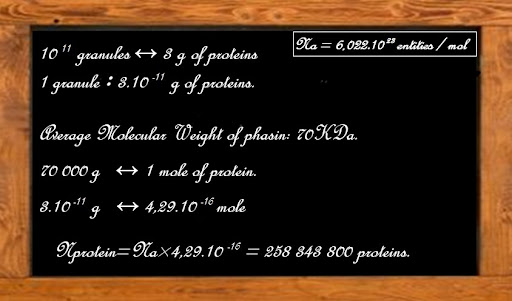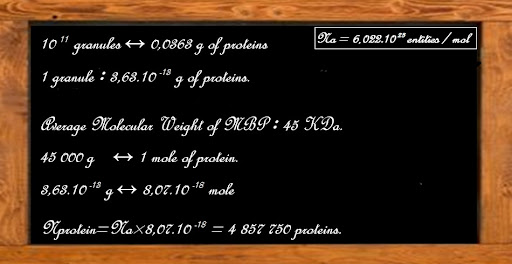Team:INSA-Lyon/Project/Modeling
From 2010.igem.org
| (4 intermediate revisions not shown) | |||
| Line 5: | Line 5: | ||
{{INSA-Lyon/menugauche}} | {{INSA-Lyon/menugauche}} | ||
| - | {{INSA-Lyon/ | + | {{INSA-Lyon/menudroppy}} |
<html xmlns="http://www.w3.org/1999/xhtml" dir="ltr" lang="en-US" xml:lang="en"> | <html xmlns="http://www.w3.org/1999/xhtml" dir="ltr" lang="en-US" xml:lang="en"> | ||
| Line 36: | Line 36: | ||
<h2>Modelling</h2> | <h2>Modelling</h2> | ||
<br><br> | <br><br> | ||
| - | <p>We are realizing this modelling to predict how many proteins of interest can be | + | <p>We are realizing this modelling to predict how many proteins of interest can be added on each granule. Those protein will be fused with the phasins construction. <br /></p> |
<br><br> | <br><br> | ||
<h3><font color="purple">Estimation of the number of proteins present on the surface of granules.</font></h3> | <h3><font color="purple">Estimation of the number of proteins present on the surface of granules.</font></h3> | ||
<br><br> | <br><br> | ||
<p> | <p> | ||
| - | Thomas Bäckström, Jane A Brockelbank and Bernd HA Rehm, (New Zealand), | + | Thomas Bäckström, Jane A Brockelbank and Bernd HA Rehm, (New Zealand), published some interesting <a href="https://2010.igem.org/Team:INSA-Lyon/Project/References">data</a> about phasins and granules. <br /> |
<br /> | <br /> | ||
| - | In their experiments , they | + | In their experiments , they managed to extract 3g of proteins from a liquid culture containing 10<exp>11</exp> granules by liter.<br/> |
| - | + | Phasins represent almost the quasi-totality of granules in number. We can make the hypothesis that these 3g of proteins correspond to 3g of phasins. The average molecular weight of the phasins is about 70 kDa. By this way, we can now estimate the quantity of proteins in mole and then the number of proteins present in each granule, using Avogadro constant.<br/> | |
<br/> | <br/> | ||
</p> | </p> | ||
| Line 69: | Line 69: | ||
<p> | <p> | ||
We designed a fusion sequence that associates a phasin, an intein and a GFP. The challenge is to know the percentage of functional hybrid proteins that would be translated in our system. Indeed, our modified phasins will be in competition with the constitutive phasins, which coding sequence is present on the bacterial chromosome. In order to displace the balance, we plan to over-express the modified phasins and to associate various phasins together, to increase its affinity for the granule, as indicated in <em>Banki and Al, 2005 </em>.<br /> | We designed a fusion sequence that associates a phasin, an intein and a GFP. The challenge is to know the percentage of functional hybrid proteins that would be translated in our system. Indeed, our modified phasins will be in competition with the constitutive phasins, which coding sequence is present on the bacterial chromosome. In order to displace the balance, we plan to over-express the modified phasins and to associate various phasins together, to increase its affinity for the granule, as indicated in <em>Banki and Al, 2005 </em>.<br /> | ||
| - | Basing on the experiments realized by this team about the purification of a Maltose Binding Protein (MBP), we can try to predict the percentage of modified phasins present | + | Basing on the experiments realized by this team about the purification of a Maltose Binding Protein (MBP), we can try to predict the percentage of modified phasins present on the surface of the granules. <br /> |
<br /> | <br /> | ||
In a liter of culture (10<exp>11</exp> granules), they measured the presence of 36,3 mg of MBP.<br /> | In a liter of culture (10<exp>11</exp> granules), they measured the presence of 36,3 mg of MBP.<br /> | ||
Latest revision as of 01:14, 28 October 2010
Modelling
We are realizing this modelling to predict how many proteins of interest can be added on each granule. Those protein will be fused with the phasins construction.
Estimation of the number of proteins present on the surface of granules.
Thomas Bäckström, Jane A Brockelbank and Bernd HA Rehm, (New Zealand), published some interesting data about phasins and granules.
In their experiments , they managed to extract 3g of proteins from a liquid culture containing 10
Phasins represent almost the quasi-totality of granules in number. We can make the hypothesis that these 3g of proteins correspond to 3g of phasins. The average molecular weight of the phasins is about 70 kDa. By this way, we can now estimate the quantity of proteins in mole and then the number of proteins present in each granule, using Avogadro constant.

It seems that each granule presents about 2,6 10
Fusion phasin/ intein/ interest protein
We designed a fusion sequence that associates a phasin, an intein and a GFP. The challenge is to know the percentage of functional hybrid proteins that would be translated in our system. Indeed, our modified phasins will be in competition with the constitutive phasins, which coding sequence is present on the bacterial chromosome. In order to displace the balance, we plan to over-express the modified phasins and to associate various phasins together, to increase its affinity for the granule, as indicated in Banki and Al, 2005 .
Basing on the experiments realized by this team about the purification of a Maltose Binding Protein (MBP), we can try to predict the percentage of modified phasins present on the surface of the granules.
In a liter of culture (10
The molecular weight of the MBP is about 45 kDa. By this way, we can estimate the quantity of MBP in mole, and then the number of phasins modified with MBP present in each granule, using the Avogadro constant .

It seems that each granule presents about 4,9 10
By this estimation, the ratio
 "
"


